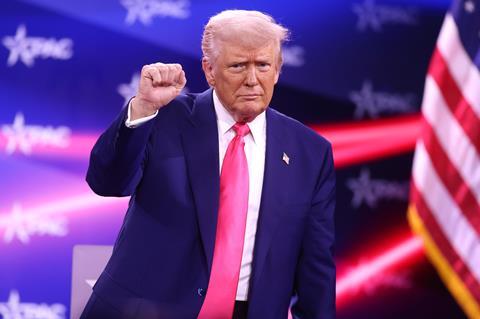US President Donald Trump has set up a task force to eradicate anti-Christian bias in government. But what exactly does that mean and is it even needed? Billy Hallowell explains

The United States is known for its constitutional protections of free speech and religious liberty, yet the First Amendment to the Constitution is also quite often the impetus for intense legal battles, misunderstandings and political chaos.
In that vein, President Donald Trump’s recent decision to establish an anti-Christian task force aimed at ending what the White House calls “the anti-Christian weaponization of government” is sparking an array of opinions.
From condemnation to support, the so-called “Task Force to Eradicate Anti-Christian Bias,” announced in February via a Trump executive order, is certainly controversial, with some pondering why the president felt compelled to take such action.
Ultimately, America must commit to protecting the religious liberty of all citizens
The reality is: despite the US being a majority Christian country, there has been a sense in recent years, based on anecdotal examples and government action, that an implicit bias against the Christian faith exists within various government agencies. The task force aims to crack down on such actions.
“The task force will review the activities of all departments and agencies to identify and eliminate anti-Christian policies, practices, or conduct,” a White House fact sheet reads. “The task force will recommend further presidential or legislative actions necessary to rectify past wrongs and protect Americans’ religious liberties.”
Polling the public
But do Americans actually feel that anti-Christian bias is a growing problem within US government institutions? As it turns out, a recent Public Religion Research Institute poll found in April that the majority of Americans — 78 per cent — oppose “the establishment of a federal task force that focuses exclusively on discrimination against Christians rather than discrimination against all religions.”
In addition, 60 per cent of Americans disagree that discrimination against Christians is as big a problem as prejudice against other groups. But despite these numbers, there’s a reality that must be confronted: Christianity is the majority religion in America, meaning that any crackdown on the presence of faith more generally would disproportionately impact followers of Jesus.
One area where this is particularly prevalent is in the discussion over the so-called “separation of church and state,” a legal tenet tied to the First Amendment.
While some use this terminology — wording not found in the Constitution but rooted in an 1802 letter written by Thomas Jefferson — to advocate for a total removal of faith from government, the intended concept was meant to avoid a theocracy or government mandating faith on the people.
Legal cases
In recent years, a hyper fixation on the concept has caused numerous problems and legal battles that do seem to create unneeded separations and, in turn, fuel the notion that anti-Christian biases exist in local, state and federal governments.
The plight of high school football coach Joe Kennedy is just one example. Kennedy lost his job coaching high schoolers after he refused to stop kneeling and praying on the 50-yard line following games. With some students choosing to join him, critics alleged a constitutional violation. But Kennedy’s prayer act, which wasn’t mandated upon anyone, was clearly constitutionally protected.
The majority of Americans oppose the establishment of a task force that focuses exclusively on discrimination against Christians
Somehow, though, he was forced into a years-long legal battle that went all the way up to the US Supreme Court. He eventually won, but millions of Americans were shocked that he was forced to fight so vociferously.
And that’s just one example. There have also been credible claims that former president Joe Biden’s administration weaponised government agencies to crack down on anti-abortion protestors - who were overwhelmingly Christian.
In fact, in January, Trump ended up pardoning more than 20 people — some who faced prison sentences of up to ten years — convicted under the Freedom of Access to Clinic Entrances (FACE) Act for blocking abortion clinics.
Many critics sounded the alarm over what they saw as an uptick in the use of this law and a wielding of it against Christians, in particular. Similar examples exist across government agencies.
In the state of Vermont, Christian families have reportedly been blocked from foster care if they refuse to bend their beliefs on biblical truth. Vermont’s Department for Children and Family Services has been under fire for reportedly cutting two families’ licenses over views on gender.
Of course, all of these instances are anecdotal examples. That said, where there’s smoke, there’s often fire.
Public perspectives
Aside from legal battles, there’s also been a general sense that people with Christian values on a variety of social issues must hold back their perspectives — while more progressive or secularist ideals are often openly perpetuated and taught in public schools and other institutions.
Ultimately, America must commit to protecting the religious liberty of all citizens, regardless of belief or lack thereof. The “Task Force to Eradicate Anti-Christian Bias,” though controversial, isn’t a barrier to living out this ideal but a vehicle for understanding how true and pervasive claims of anti-Christian bias have become.
The best approach at this point is to monitor the task force’s findings and see what comes next.






































No comments yet